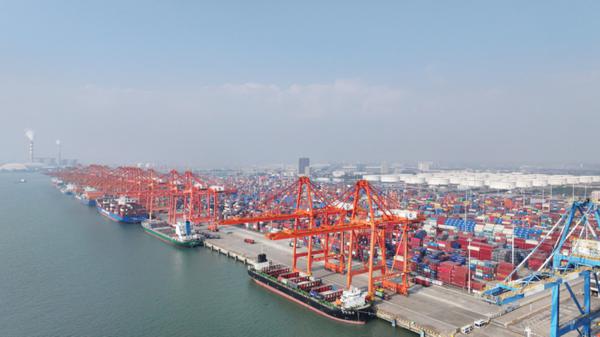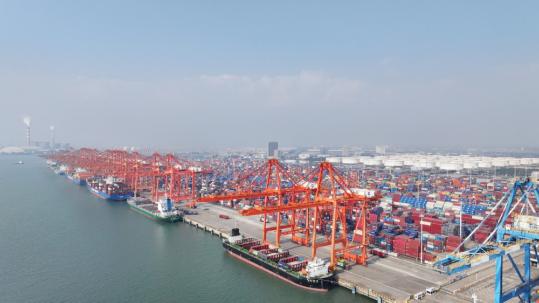Beibu Gulf Port retains double-digit growth

The Qinzhou section of Beibu Gulf Port in South China's Guangxi Zhuang autonomous region. (TAN KEXING/FOR CHINA DAILY)
Beibu Gulf Port in South China's Guangxi Zhuang autonomous region handled more than 9 million twenty-foot equivalent units (TEUs) in 2024, marking a significant milestone.
The port has maintained double-digit growth for eight consecutive years, ranking among the top major coastal ports in China.
This achievement marks a new chapter in the development of Beibu Gulf Port as an international gateway and hub, laying a solid foundation for its journey to become a world-class port with a handling capacity of tens of millions of TEUs.
"In 2024, we focused on market demand and resource development, implementing tailored strategies to increase the development of specialized cargo sources," said Xiang Zheng, executive vice-president of Guangxi Beibu Gulf International Port Group Co Ltd.
"We continuously promoted the transportation of goods from Guangxi through Beibu Gulf Port. The container throughput of key customers within Guangxi is expected to have increased by 28 percent year-on-year in 2024."
The port also strengthened its efforts in organizing and developing new sea-rail intermodal transport sources, such as photovoltaic glass. The sea-rail intermodal transport volume is expected to have grown by 5.6 percent year-on-year in 2024.
To enhance efficiency, the port has taken steps to improve container ship turnaround time, which is expected to have increased by 6 percent year-on-year in 2024.
The port has also actively addressed issues relating to container production and operations, as well as feeder barge transportation.
Furthermore, Beibu Gulf Port has continuously optimized its shipping network layout, particularly in Southeast Asia, and a direct shipping route between Beibu Gulf Port and Haiphong, Vietnam, was recently launched. As of now, the port boasts a total of 80 shipping routes, including 49 foreign trade routes, covering major domestic ports and key ports in Southeast and Northeast Asia.
Beibu Gulf Port has also made significant progress in sea-rail intermodal transportation with support from the General Administration of Customs and China State Railway Group. Collaborative efforts have led to the establishment of a comprehensive transportation network that efficiently connects the inland regions via the Pinglu Canal.
In terms of smart port construction, the port group has made advancements in information technology systems for customer service.
The implementation of the railway container intelligent operation system at Fangchenggang Port has significantly improved the efficiency of integrated loading and unloading operations.

